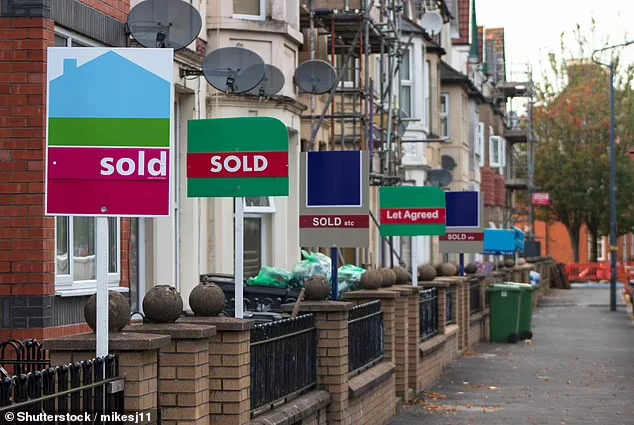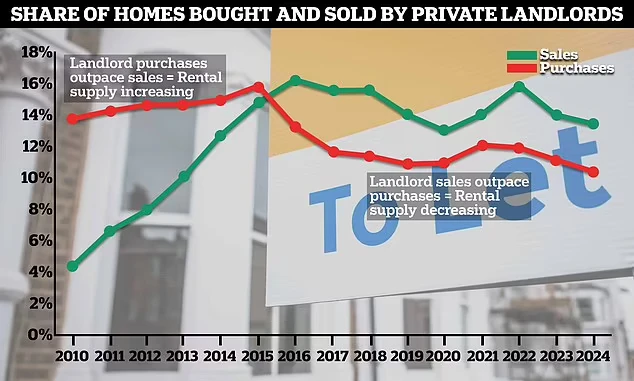
With the Autumn Budget looming large in the minds of landlords, some have decided to sell up in order to avoid higher costs now and a possible capital gains tax raid in future.
The fear among buy-to-let owners is that Chancellor Rachel Reeves, will massively hike CGT in the Budget, as part of her bid to fill her claimed ‘£22billion black hole’ in the UK’s finances.
Currently, higher-rate taxpayer landlords would pay 24 per cent on gains they make on their properties, but this could increase to 40 per cent if the Chancellor decided to bring capital gains tax in line with the rate of income tax.
Regardless of a potential CGT raid, more buy-to-let landlords are already selling up. However, many will be left wondering how to save or invest the proceeds after the sale of their property is completed.
Paying into a pension could prove to be a lucrative move, as it could effectively recoup money lost to capital gains tax and boost their retirement pot.
Putting cash into their pension would fit with the investing strategy of many landlords, who use property investments as a nest egg for retirement.
Pension tax relief means landlords could claw back some money lost to capital gains tax. They can contribute as much as the £60,000 annual allowance this year to a pension and potentially more if they have previous years to carry forward.
Steven Cameron, pensions director at Aegon, said: ‘There’s widespread speculation that the Autumn Budget could bring increases to the rates of capital gains tax and possible changes to pensions taxation, such as the loss of higher or additional rate tax relief on personal contributions.
‘The threat of more penal rates of CGT is reported to be prompting many landlords to consider selling rental properties.
‘This is reshaping the longstanding debate between investing in property versus a pension, particularly relevant to those people who might regard second properties as their retirement saving.’
‘Those considering selling a rental property might consider investing the proceeds in a pension or stocks and shares Isa.’
Landlords are taking note of the speculation on capital gains tax but it is pressure elsewhere that is prompting many to sell.
Higher mortgage rates, less generous mortgage interest tax relief, greater regulation, the cost of energy efficiency improvements and other increased bills are encouraging more to cash in gains and move on.
There are other reasons landlords may be looking to sell, however. These include higher mortgage rates and the Renters’ Rights Bill which will make it harder to evict tenants without a good reason.
Should you reinvest your cash into a pension?
As a buy-to-let owner, it’s unlikely that you could put your property on the market now and sell it before the Budget on 30 October.
But those that are already in the process may find themselves quids in before that date rolls around.
Capital gains tax is charged on annual profits on assets of more than £3,000. As it stands, landlords who are in the process of selling will face 24 per cent CGT if they are higher rate or additional rate taxpayers.
Basic rate taxpayers face capital gains tax at 18 per cent but gains are added to their other income to decide the rate – meaning they could be pushed into the higher rate bracket.
Landlords could consider paying the proceeds of their sale into a self-invested personal pension, known as a Sipp, as a way to claw back their CGT loss on the sale, and provide a boost to their pension in one fell swoop.
Pension contributions for most people automatically qualify for basic rate tax relief from the Government.
In order to take savers back to the position they were in before 20 per cent tax, contributions get a 25 per cent uplift – turning £80 paid in back into £100 pre-tax, for example.
Higher rate and additional rate taxpayers can claim the rest of their tax relief through self-assessment, delivering 40 per cent and 45 per cent tax relief on contributions.
The annual allowance – and need to be a high earner
There is a pension annual allowance that caps contributions eligible for tax relief at £60,000 per year, so for those making big profits it might take a number of years to contribute the funds from the property sale.
However, savers can carry forward unused allowances from up to three years previously, provided they were part of a registered pension scheme during those years. This would include a workplace pension scheme.
People can also only get tax relief on private pension contributions worth up to 100 per cent of their relevant annual earnings.
Neither rent or capital gain on a property will count as annual earnings for this, meaning that to pay the maximum into a pension, someone would generally need to earn £60,000 from employment or self-employment.
Those who have previously flexibly withdrawn money from a pension may have a lower £10,000 annual allowance.
Very high earners with adjusted incomes of more than £260,000 have their annual allowance tapered down.
Savers should also realise that withdrawals from their pension scheme will be taxed beyond the first 25 per cent, which is tax-free.
Cameron explained: ‘The pension annual allowance is currently £60,000, with the potential to carry forward unused allowances from the past three years.
‘In some circumstances, making a personal pension contribution, could also result in some or all of the capital gain from the rental property sale being taxed at the basic rate of CGT, 18 per cent, rather than the higher rate 24 per cent.
‘Paying into a pension means you can’t access your funds, currently until age 55 but rising to 57 in 2028. However, you could qualify at present for tax relief at your highest marginal income tax rate.’
According to data from the Institute for Fiscal Studies, between 30 and 40 per cent of private sector employees, equating to between 5 and 7million people, are on course to see their workplace pension fail to meet the requirements for a minimum standard of living.
Diverting your money into a pension also gives you access to a tax-friendly wrapper which will allow your investments to grow without facing further capital gains, dividend and income tax.
Landlords making big gains and considering paying into a pension would be wise to speak to a specialist tax or financial adviser, who can help explain their options and make sure things are done correctly.
| Capital gain | Current basic | If aligned | Impact | Current higher | If aligned | Impact | Current additional | If aligned | Impact |
|---|---|---|---|---|---|---|---|---|---|
| Gain | 18% | 20% | 24% | 40% | 24% | 45% | |||
| £10,000 | £1,260 | £1,400 | £140 | £1,680 | £2,800 | £1,120 | £1,680 | £3,150 | £1,470 |
| £20,000 | £3,060 | £3,400 | £340 | £4,080 | £6,800 | £2,720 | £4,080 | £7,650 | £3,570 |
| £30,000 | £4,860 | £5,400 | £540 | £6,480 | £10,800 | £4,320 | £6,480 | £12,150 | £5,670 |
| Source: Quilter | |||||||||
What if capital gains tax is hiked in the Budget?
It looks highly likely that capital gains tax rates will be raised in the Budget.
It has been suggested that Rachel Reeves could equalise CGT with income tax and change the higher rate to 40 per cent, and the additional rate to 45 per cent. Basic rate taxpayers could see a lesser increase to 20 per cent.
Of course, if any Budget changes do come in, they might not be as extensive as landlords fear – and they might not come into force immediately.
Economists have warned against raising capital gains tax rates to as high as income tax rates without bringing in indexation, so that only gains above inflation are taxed.
If capital gains tax was raised to income tax levels and pension tax relief remained the same, landlords could potentially recoup their CGT by paying profits into a pension.
Landlords should also consider making use of their Isa allowance in order to benefit from another tax wrapper.
With an annual Isa limit of £20,000, this combined with paying £60,000 into a pension could allow themto place up to £80,000 of proceeds into tax-efficient accounts, without having carried forward any pension allowances.
Unlike pensions, Cameron said, ‘Isas offer tax-incentivised savings without locking your money away.

How many landlords are selling up?
Figures from Rightmove show that 18 per cent of homes currently up for sale were previously available to rent. This compares with just eight per cent in 2010.
In London, this figure rises to almost a third of homes having previously been available to rent. In the North East and Scotland, 19 per cent were previously rented.
Meanwhile, data from Hamptons reveals that the number of homes being bought by landlords has dropped to a 14-year low.
Original Post from https://www.thisismoney.co.uk


